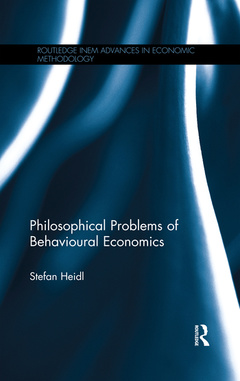Philosophical Problems of Behavioural Economics Routledge INEM Advances in Economic Methodology Series
Auteur : Heidl Stefan

The goal of behavioural economics is to improve the explanatory and predictive power of economics. This can be achieved by using theoretical and methodological resources of psychology. Its fundamental idea is that the relationship between psychology and economics cannot be subsumed under standard philosophical accounts of intertheoretical relations.
Philosophical Problems of Behavioural Economics argues that behavioural economics is best understood as an attempt to deidealize economic theory guided by psychological research. Behavioural economics deconstructs the model of decision-making by adding different elements. Based on this understanding behavioural economics has a number of tasks: first, it has to identify which economic theory needs to be challenged; second it aims to identify factors which need to be modelled within economic theories of choice and modify the theory accordingly; and finally, it has to create models that explain economic phenomena based on the new theory. This book analyses the different stages of this deconstruction process and shows how the scientific disciplines of economics and psychology are connected by it.
This volume develops a new account of intertheoretical relations based on the idea of deidealization and thus contributes to debates within the philosophy of social science. It is suitable for those who are interested in or study economic theory and philosophy, economic psychology and philosophy of social science.
1. Introduction
2. The Ontological Status of Economic Preferences
3. Selectionist Arguments against a Deidealisation of Economics
4. Aggregation and the Deidealisation of Economic Theory
5. Explanatory Autonomy and Intertheoretic Relations
6. Localising Anomalies of Economic Theory
7. The Structure of Behavioral Economic Theories
8. Models in Economics: Standard and Behavioral
9. Conclusion
Stefan Heidl is a lecturer and research associate at the Institute for Philosophy, University of Bonn, Germany.
Date de parution : 08-2019
13.8x21.6 cm
Disponible chez l'éditeur (délai d'approvisionnement : 14 jours).
Prix indicatif 50,12 €
Ajouter au panierDate de parution : 05-2016
13.8x21.6 cm
Disponible chez l'éditeur (délai d'approvisionnement : 14 jours).
Prix indicatif 178,41 €
Ajouter au panierThème de Philosophical Problems of Behavioural Economics :
Mots-clés :
Behavioural Economic Theories; Deidealisation of Economics; Behavioural Decision Research; Economic Theory; Standard Economic Theory; Intertheoretic Relations; Behavioural Economic; Behavioral Economic Theories; Behavioural Economic Models; Models in Economics; Philosophy of Economics; Expected Utility Theory; Economic Methodology; Standard Economic Explanation; Equity Premium Puzzle; Standard Economic Model; Choice Behaviour; Influence Choice Behaviour; Ultimatum Game; Loss Aversion; Revealed Preference Theory; Loss Averse Investor; Explanatory Autonomy; Individual Choice Behaviour; Partition Dependence; Behaviouristic Interpretation; Loss Aversion Parameter; Epistemic Iteration; Mentalistic Preference; Bootstrap Method Statements; Equity Premium



